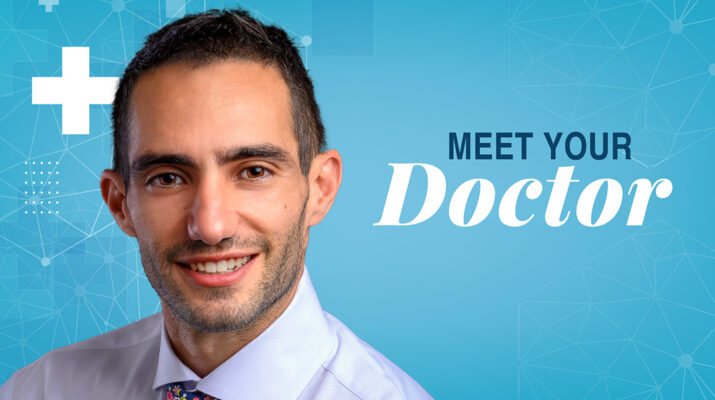New primary care doctor at St. Joe’s has done medical missions in Ghana, Haiti, Peru, Uganda, Rwanda. ‘In a lot of ways, I think that’s what inspired me to pursue a career in primary care,’ he says.
By Chris Motola
Q: What brought you to Central New York?
A: Well, I was born and raised in New Jersey; I went to undergrad in New Jersey. I did my medical training in West Virginia and then went back to New Jersey for my residency. I did my residency in family medicine with the idea of doing whole-spectrum family medicine. That somehow brought me out to Iowa where I was working in a very small critical access hospital. Only 20 beds. That gave me a unique opportunity to work with a very small, underserved community. After a while I got really homesick and missed family and friends back on the East Coast. I realized how important work-life balance is for doing my job effectively. That got me back on the East Coast. St. Joe’s has a great family medicine program, so I thought this was the perfect opportunity to do what I love and be a faculty teacher in an academic environment. So that’s why I’m here.
Q: How long have you been practicing here?
A: I moved here in September. It’s amazing how time went by so quickly.
Q: You’ve done a number of missions over the years.
A: Yeah. My first mission trip was 10 years ago. After college I was working in pharmaceuticals with Johnson & Johnson in New Jersey in a desk job. I wasn’t really challenged or inspired by my work. It felt very financially driven. I had always been inspired by the work of physicians like Patch Adams who did things differently, did a lot of nonprofit work, domestic and international. I was just sort of searching for deeper meaning and purpose in my own life. That got me into mission trips. My first was to Ghana. I went with a big group, which is always cool because you’re meeting people from all over the world. I was working at a school for children with special needs. I did a number of other trips to Haiti, Peru, Uganda and Rwanda. Once I got to Haiti and Uganda I started working more in the medical realm, working in local hospitals and health clinics. The other part of that was just trying to understand some of the challenges people face in underserved communities and finding solutions to everyday problems. In a lot of ways, I think that’s what inspired me to pursue a career in primary care. Using medicine as a platform to create change and bring people together. I haven’t really traveled since I finished medical school. For now I’m trying to get my feet under me, getting experience and looking for opportunities to partner and maybe get involved in that again in the future.
Q: How do you apply the insights from your mission work to your domestic practice?
A: Working here in Syracuse, I see a lot of need locally, people struggling with financial issues. There are a lot of things we can do here. It’s not an easy answer, but I think it takes people from all different backgrounds working together to find solutions.
Q: What about primary care appealed most to you?
A: It was a lot of different things. In Haiti I was working with a primary care doctor. In medical school, I was really inspired by my mentor who was a primary care physician who also did obstetrics. That was a very unique thing; I didn’t even know that was possible, to be a family doctor and deliver babies. And then I used the inspiration I had from my overseas travels. I saw so many issues with maternal and child health. And I thought what a better way to get involved than enter a field where you can wear so many different hats. So it’s a challenge but it’s very gratifying. And there’s definitely a relationship aspect to that. Taking care of people and watching their babies grow.
Q: What did you learn from your time in the pharmaceutical industry?
A: Obviously medications are very important in our field, but there are just so many financial barriers that patients run into. Insurance companies not always approving prescriptions. That’s always a struggle. I have a lot of respect for what they do, but I think there are better ways to make those medications available.
Q: Do you see yourself settling in Central New York for the long haul?
A: Yeah, I do. I’m really happy with my job. I think this hospital gives me a lot of support. I have great mentors around me, people who have done their residency training here and stayed here for 20, 30 years. So I’m allowed to pick their brains and, in turn, as a teacher, hopefully inspire younger physicians. And it’s close enough to home where I can still see my parents or go home for a weekend if I need to. I can have a life outside of work, too, which I enjoy.
Lifelines
Name: Anthony Ciricillo, M.D.
Position: Family Care Physician and Obstetrician at St. Joseph’s Physicians Primary Care in Fayetteville
Hometown: Belleville, New Jersey
Education: West Virginia University School of Medicine
Affiliations: St. Joseph’s Health Hospital
Organizations: American Academy of Family Physicians
Hobbies: Pickleball

